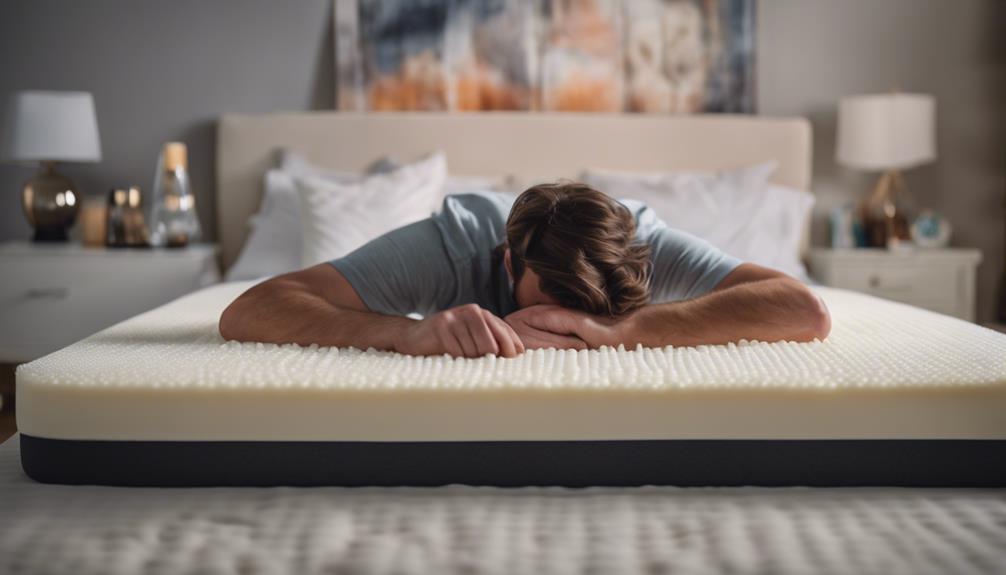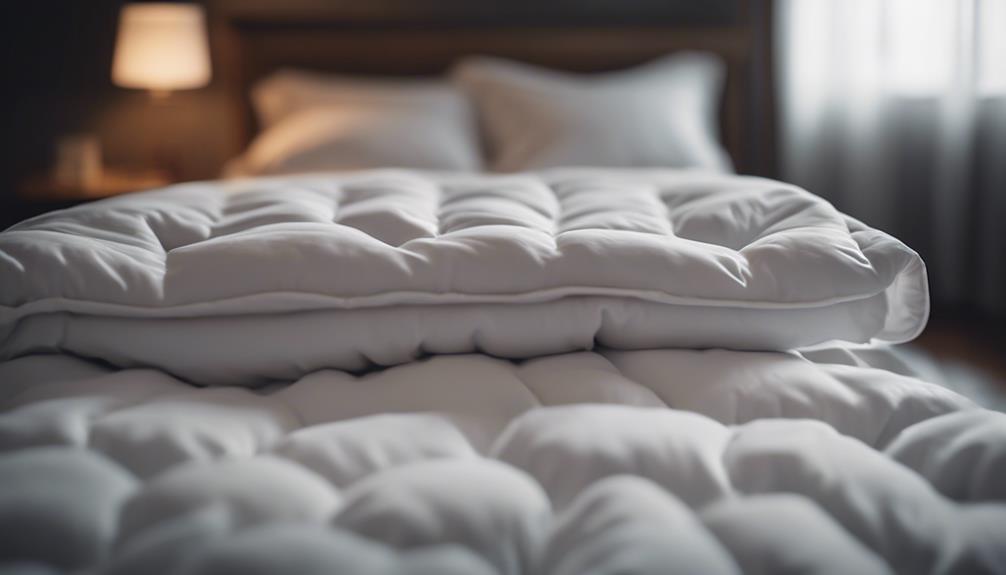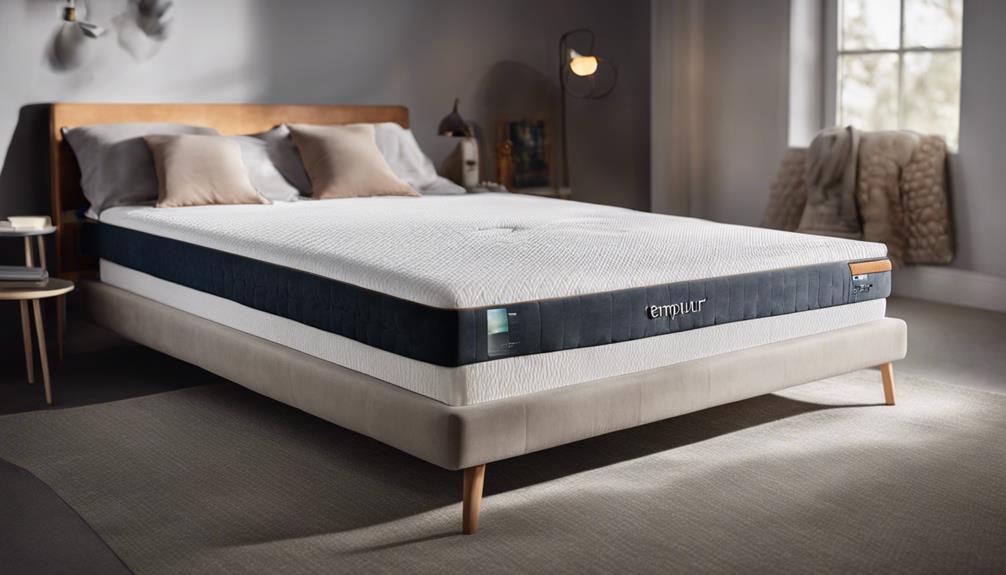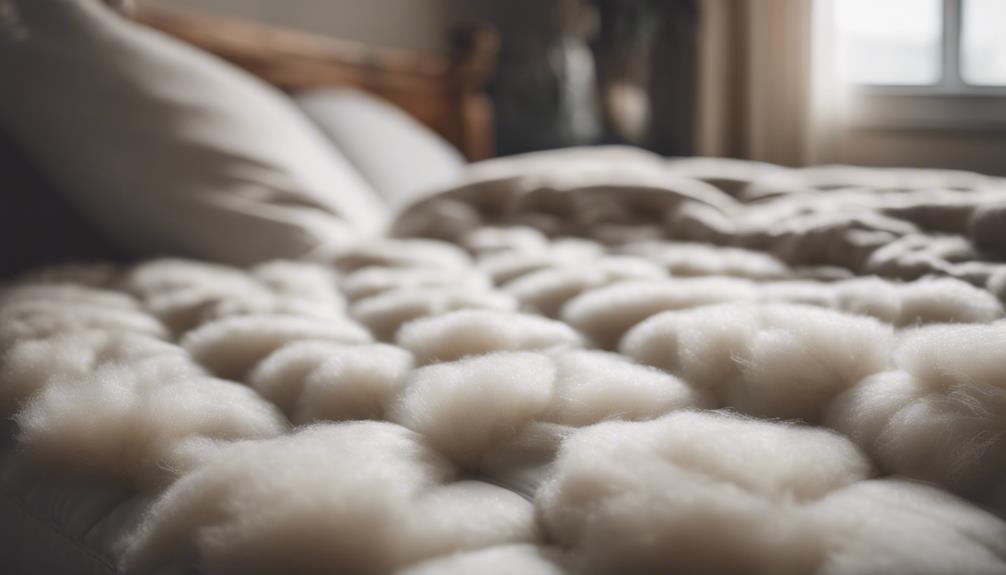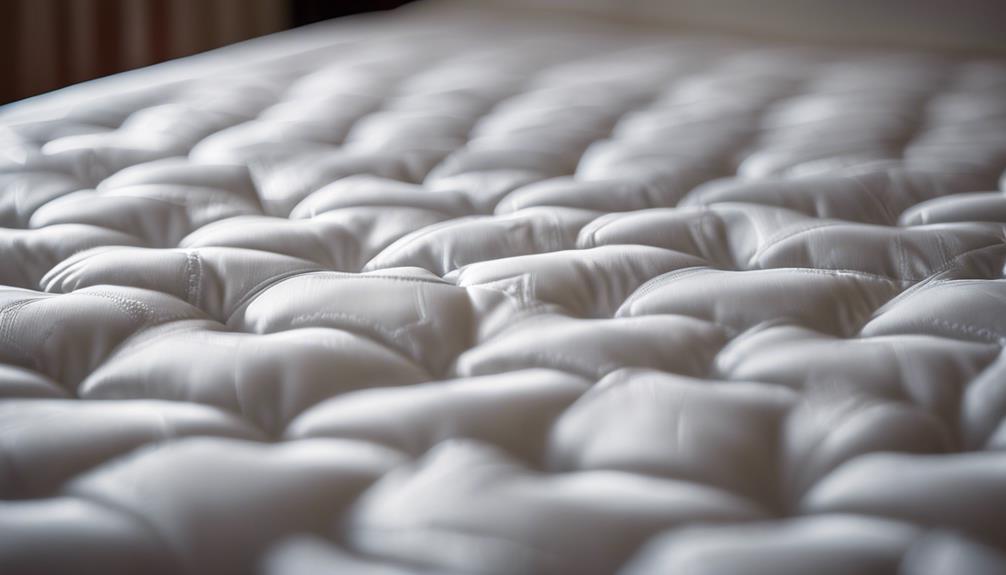Memory foam mattress toppers can be bad for your back as they may lack proper support, leading to spine misalignment and aggravating back pain. Opting for firmer toppers can offer better support and alignment, essential for back health. Consider individual preferences and sleeping positions when choosing firmness and thickness. Soft toppers may worsen existing back issues due to lack of support and increased pressure. Prioritize proper spinal alignment with medium-firm toppers that prevent excessive sinking. Remember, finding the right balance between comfort and support is essential. Discover more about optimizing your sleep environment for back health.
Key Takeaways
- Memory foam toppers can exacerbate back pain by compromising essential support.
- Soft toppers may lack support, leading to increased pressure and potential worsening of back issues.
- Optimal firmness and thickness are crucial for proper spinal alignment and back health.
- Choosing a firmer topper can provide better support and prevent sinking that compromises alignment.
- Balance between comfort and support is essential; medium-firm toppers are generally recommended for back health.
Impact of Memory Foam Toppers on Back
Often, memory foam mattress toppers can exacerbate back pain by compromising essential support. When these toppers are too soft, they may cause a sinking feeling, especially on mattresses that lack firmness.
The inadequate support provided by memory foam toppers can lead to misalignment of the spine, increasing discomfort in the back. It's vital to emphasize that these toppers often fail to address the root cause of back pain, offering only temporary relief at best.
Choosing the right mattress topper material is important to avoid exacerbating existing back issues. Opting for a firmer topper can help provide better support and alignment for the spine, potentially reducing the impact of back pain.
While memory foam mattress toppers are popular for their comfort, it's essential to consider the support they offer, especially when dealing with back problems that require long-term solutions.
Choosing Optimal Firmness and Thickness
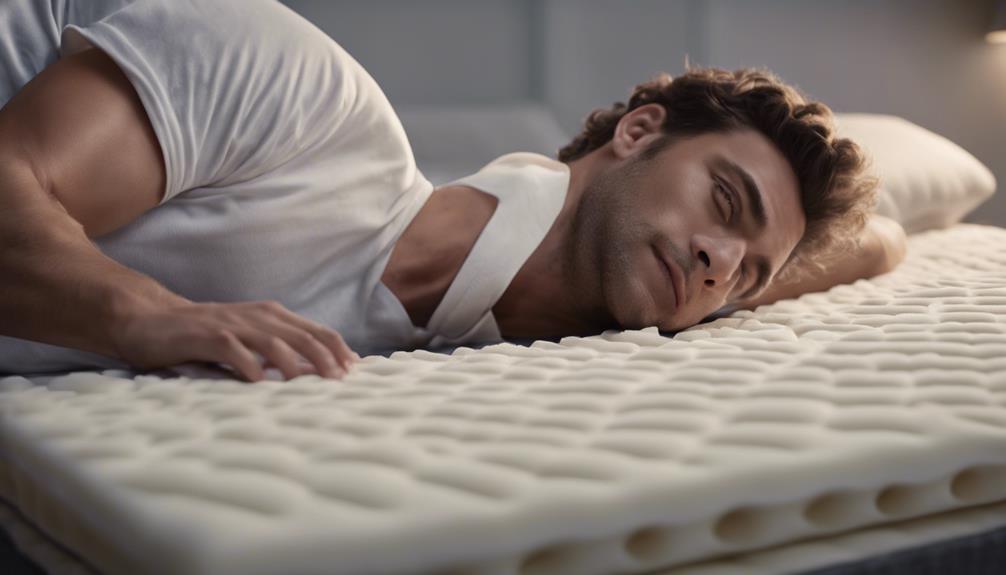
When selecting a memory foam mattress topper, consider individual preferences and sleeping positions to determine the best firmness and thickness for back health and comfort. The importance of the topper plays a vital role in providing adequate support and alignment for your spine. Back sleepers often benefit from firmer toppers to maintain proper posture and reduce the risk of back pain.
On the other hand, side sleepers may prefer slightly softer toppers to cushion pressure points such as shoulders and hips. Finding the right balance between firmness and thickness is essential to guarantee both back health and overall comfort.
It's important to take into account your personal comfort levels and body weight when choosing the best firmness and thickness of a memory foam mattress topper. By aligning these factors with your sleeping position, you can enhance the quality of your sleep and promote better spinal alignment for improved back health.
Potential Back Issues With Soft Toppers

Soft mattress toppers can pose potential back issues by failing to provide adequate support for individuals with back problems, potentially leading to improper spinal alignment and heightened pressure on sensitive areas. When contemplating memory foam mattress toppers for back pain relief, it's important to weigh the following points:
- Lack of Support: Soft toppers may not offer the necessary support for proper spinal alignment, which can worsen existing back pain.
- Increased Pressure: The softness of these toppers can lead to heightened pressure on sensitive areas of the back, causing discomfort and potential long-term issues.
- Sinking and Sagging: Over time, soft toppers may sag or develop impressions, further compromising support and potentially exacerbating back pain.
- Inadequate Firmness: Individuals requiring a firmer surface for back health may find soft toppers inadequate in providing the necessary support for alleviating back pain.
When addressing back pain concerns, it's important to take into account the firmness and support level of a mattress topper to ensure proper alignment and pressure relief for a restful night's sleep.
Ensuring Proper Support for Your Back
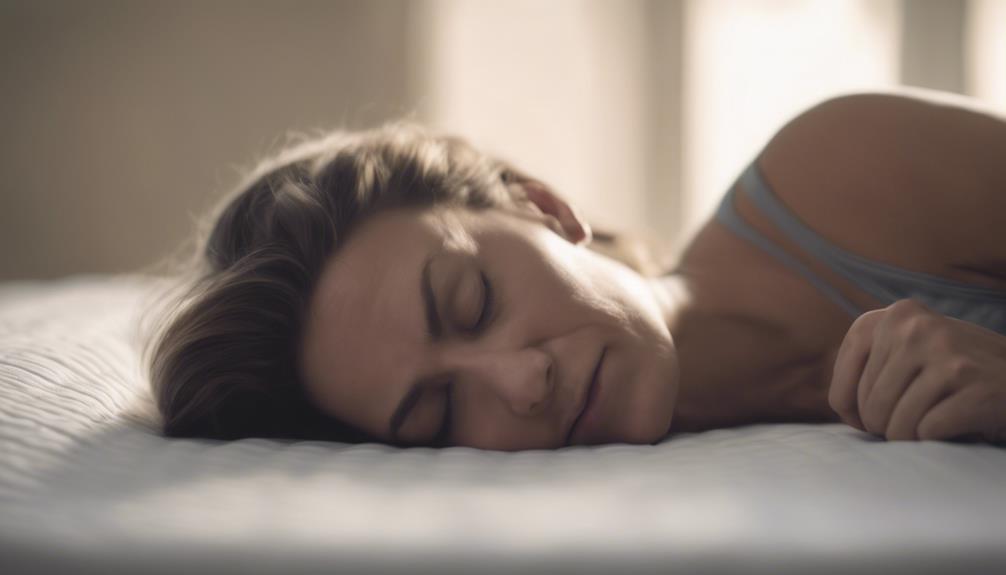
To maintain good spinal alignment and reduce back pain, it is important to make sure that your mattress topper provides proper support for your back. When it comes to memory foam mattress toppers, the level of support they offer plays a significant role in back health. Look for a topper that strikes a balance between comfort and firmness to guarantee your back is well-supported while sleeping. Opting for a medium-firm memory foam topper can help prevent your body from sinking too deeply into the mattress, promoting proper alignment of the spine.
Consider investing in a high-quality memory foam mattress topper that prioritizes support to alleviate back pain and enhance the overall quality of your sleep. To help you understand how different levels of firmness can impact your back support, take a look at the table below:
| Firmness Level | Support Provided | Effect on Alignment |
|---|---|---|
| Soft | Inadequate | May cause misalignment |
| Medium | Optimal | Supports natural spine curvature |
| Firm | Excessive | Can feel too rigid for comfort |
Addressing Back Pain Concerns
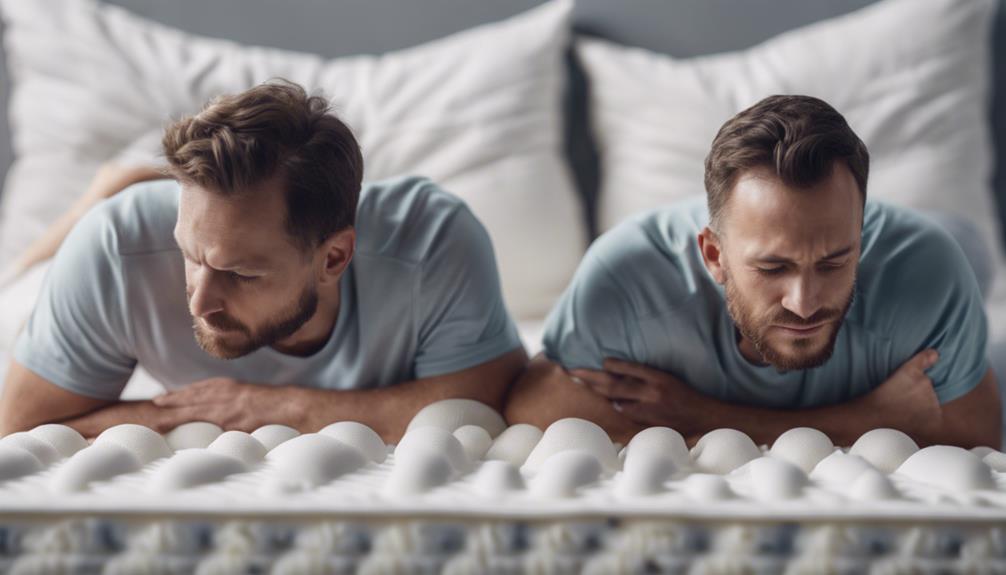
Addressing concerns about back pain with memory foam mattress toppers requires careful consideration of their potential impact on spinal alignment and support. When it comes to back pain concerns and memory foam toppers, here are some key points to keep in mind:
- Memory foam toppers can exacerbate back pain by reducing the necessary support for the spine, especially if the topper is too soft or worn out.
- Sleeping out of alignment on a memory foam topper can lead to muscle tension and morning aches, further aggravating existing back issues.
- In most cases, memory foam toppers don't address the root cause of back pain but rather provide a cushioning effect that may not be sufficient for some individuals.
- Toppers can sometimes worsen back pain by misaligning the body during sleep, causing discomfort and potentially long-term issues if not addressed promptly.
Considering these factors is vital in evaluating whether a memory foam topper is suitable for alleviating back pain concerns or if it may actually exacerbate them.
Tailoring Memory Foam Toppers for Comfort
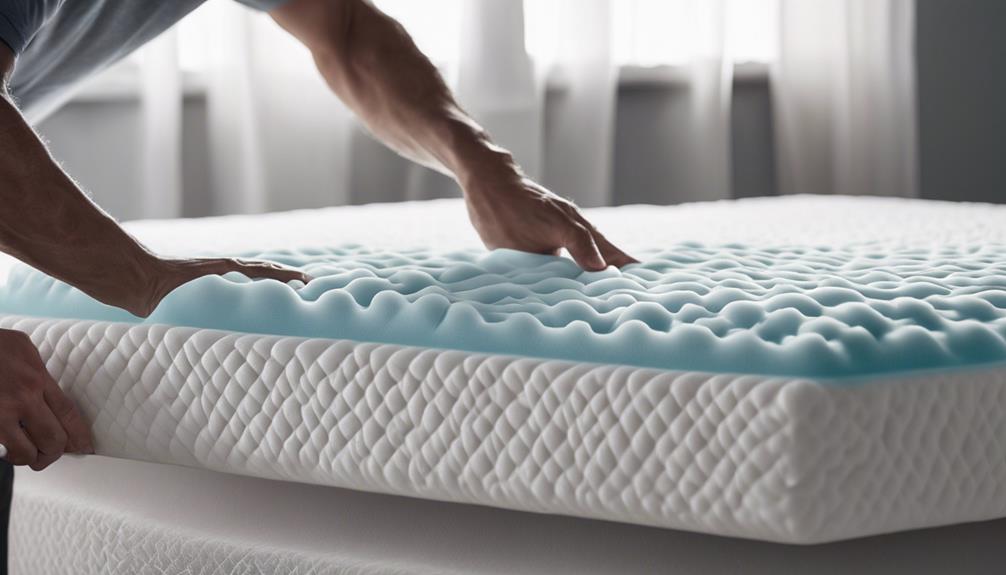
When customizing memory foam toppers for comfort, selecting the appropriate thickness and density is key to enhancing back health. The thickness of a memory foam topper can play an important role in providing support for back pain relief. Thicker memory foam toppers offer better cushioning and can help align the spine, reducing discomfort during sleep.
Additionally, considering the density of the memory foam is significant. High-density memory foam toppers are more durable and provide enhanced support, which can be beneficial for individuals with back issues.
Understanding your sleeping position is also essential when choosing a memory foam topper. Different sleeping positions may require varying levels of firmness and support to promote proper spinal alignment. Additionally, selecting a memory foam topper with cooling properties can enhance comfort by regulating temperature and preventing overheating, which can contribute to back discomfort.
Frequently Asked Questions
Can a Memory Foam Topper Cause Back Pain?
Memory foam toppers can indeed cause back pain. If they lack proper support or are too thick, they might misalign the spine and strain muscles, worsening existing pain. Inadequate firmness from these toppers can lead to discomfort and stiffness in the back.
It's important to make sure that the memory foam topper provides adequate support for your spine to prevent any potential back issues.
What Are the Cons of a Memory Foam Mattress Topper?
Memory foam mattress toppers have some drawbacks worth considering. They can lack the necessary support, leading to back pain. Some might find them too soft, causing discomfort and sinkage.
These toppers may not offer the firmness needed for proper spinal alignment during sleep. Heat retention is another issue that can affect sleep quality.
Over time, they may lose shape and support, potentially contributing to back pain.
Is It Bad for Your Back to Sleep on Memory Foam?
Sleeping on memory foam can be harmful to your back if the mattress topper lacks proper support and alignment. It's essential to find a balance between softness and firmness to prevent back pain.
Without adequate support, memory foam may exacerbate existing back issues. Selecting a topper that suits your body weight and sleeping preferences is key to maintaining spinal health and avoiding discomfort.
Is It Good to Sleep on a Memory Foam Topper?
We absolutely love sleeping on a memory foam topper! It provides fantastic pressure relief and support, distributing body weight evenly to reduce strain on the back.
The improved spinal alignment and contouring properties promote better posture and alleviate discomfort. Choosing the right firmness and thickness enhances back health and overall comfort.
Memory foam toppers are a dream come true for a peaceful night's sleep!
Conclusion
In summary, memory foam mattress toppers can have a significant impact on your back depending on their firmness and thickness. It's essential to select a topper that provides proper support to prevent potential back issues.
By customizing your memory foam topper for comfort and addressing any back pain concerns, you can guarantee a restful and supportive night's sleep. Keep in mind, the key is finding the ideal balance for your individual needs to maintain a healthy back.
